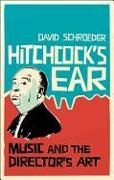Ulteriori informazioni
Zusatztext Schroeder uses specific examples in exhaustive detail to illustrate his points. Because of the tireless detail presented here, the text has a great deal of value to learned scholars of Hitchcock studies, film theory, and music... It should provide scholars with an essential reference for future studies on the master’s oeuvre. Informationen zum Autor David Schroeder holds a PhD from Cambridge University, and is Professor Emeritus at Dalhousie University. His books include Haydn and the Enlightenment (Oxford UP, 1990), Mozart in Revolt (Yale UP, 1999), Cinema's Illusions, Opera's Allure: The Operatic Impulse in Film (Continuum, 2002), and Our Schubert: His Enduring Legacy (Scarecrow, 2008). Vorwort The author focuses on the way that music has infiltrated Hitchcock's thinking as a director, from his earliest silent films to his last works. Zusammenfassung Focuses on the way that music has infiltrated Hitchcock's thinking as a director, from his earliest silent films to his last works. This title also focuses on how an expanded definition of music influences Hitchcock's conception of cinema. Inhaltsverzeichnis List of Illustrations Preface Introduction 1 The Sway of America and Europe 2 The Lodger : A London Symphony 3 The Music of Montage: Blackmail 4 Waltzes and the Dance of Death 5 Shadow of a Waltz 6 Through a Rear Window Darkly 7 The Piano: Instrument of Seduction 8 Mozart vs. Wagner: Order and Ambiguity 9 Going Popular Appendices Bibliography Selected DVDs and VHS Index

